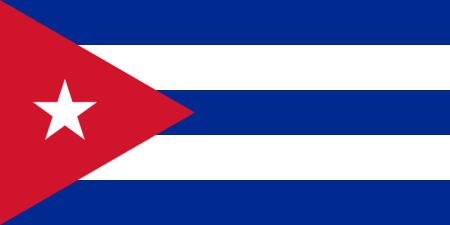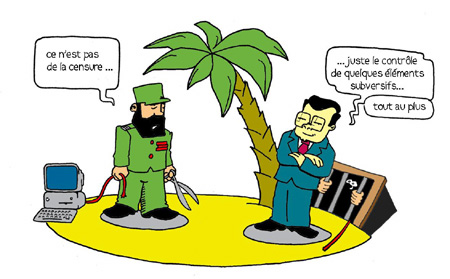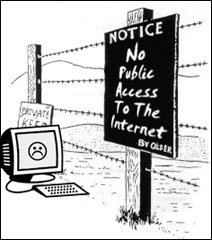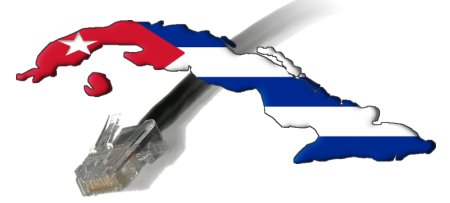How can Internet contribute to freedom of speech in Cuba ?

A terrible lack of freedom of speech
Cuba is one of the world’s ten most repressive countries as regards free expression.
This island is considered as the world’s biggest prison for journalists. Indeed, in an article from Nueva Prensa Libre, an association that defends freedom of speech in this country, the author says that “In Cuba, they don’t just censor you now – they throw you in jail.” The police has for example rounded up many independent journalists and political dissidents for writing articles criticizing the Cuba’s political system.
On the website Cubanet.org, you can consult the list of journalists in prison.

Internet in Cuba : a very controlled access
There’s a paradoxical and contradictory situation about Internet in Cuba.
On the one hand, the government tries to learn new technologies to thousands of students and to develop this tool because it’s part of the country’s economic development. But on the other hand, the government tries to prevent the population from having access to the Internet. They consider this communication tool as “the great disease of the 21st century” (this sentence comes from a report written by RSF, Reporter without Border).
As a result, Internet use is very restricted and under surveillance. The access is only possible for those who can obtain a permission from the ministry of domestic commerce.

Moreover, the acquisition of the equipment is strictly controlled. It results very hard to find computers because the equipment is rationed and very expensive. You can only find computers in state shops, where only a few authorised persons can enter. The priority is given to political figures, officials, intellectuals, researchers and journalists working for the government. Internet is reserved for the ruling elite.
But Cubans have found ways to get round the government’s censorship, by buying Internet access on the black market or sharing the few authorised connections. Of course, it’s strictly forbidden to do that (the government severely punishes illegal use of the Internet), and Cubans have to do it clandestinely. But such tips are maybe the solution for the inhabitants to express themselves…
Yes, Internet can be a way to protest…

If the Internet is so controlled, it means that it can be an efficient way to protest against Cuba’s political problems. That’s why the governement try to regulate the access to this fantastic communication tool.
Indeed, Cuba is very isolated from the rest of the world. They don’t have access to foreign newspapers, so they’re not informed about what happens in other democratic countries. In this context, Internet can be a good way for Cubans to compare their situation with the situation of other people in democratic countries. Communicating with other people all over the world through forums, chats or blogs can contribute to the awareness. That’s why I think that Internet can help Cubans to be informed about the situation in the rest of the world.
But Internet can also be an influent tool to inform the rest of the world about Cuba’s situation.
Creating a blog is an opportunity to explain to people in different countries what is the situation like in Cuba. Indeed, we only have information from our occidental media, or from organizations like RSF (Reporters Without Frontiers) or Amesty International. And I think that being informed about Cuba by its inhabitants is an important point.
Moreover, the third point is that Internet can also constitute a new dialog space. It can permit the emergence of what we could call an « electronic debate ». Of course, people who participate to this debate must keep anonymity.
It’s a way for intellectuals, journalists and artists to discuss about their situation and to lead to a bigger rebellious movement, including a large part of Cubans. When this movement will have growth enough, the governement will be forced to react. Indeed, it’s easier to put in jail one dissident than to punish thousands of people expressing their opinion online. And it’s easier to censor one article in a newspaper than to apply censorship on Internet !
To conclude, many actions remain to be put in place to defend human rights in Cuba.
In this context and for all the reasons explained, I think that Internet could be a key to improve the freedom of speech in this country.
If you want to learn more about this subject, you can consult the report published by the organization “Reporters without frontiers” : “Cuba : he Internet under surveillance”.
November 18, 2008 at 12:00 pm
Well done, Zelie. Very interesting.
November 19, 2008 at 6:25 pm
Really good article Zélie.
I learned a lot about this process in Cuba.
November 20, 2008 at 2:31 pm
Very interesting post and subject. Cuba and its people deserve we talk about them because we ignore many things about the real situation there.
November 21, 2008 at 9:13 pm
[…] Another article I recommend you is about Cuba, a country I’m very interested in. I explain that there’s a terrible lack of freedom of speech in the island. And I demonstrate that Internet (althought its access is very controlled) can contribute to freedom of speech, and how it can be a way to protest against Cuba’s political problems. […]
December 3, 2008 at 11:10 pm
[…] If you’re interested in Internet and social causes, I’ve written an article about how Internet can solve the problem of freedom of speech in some repressive countrie… […]